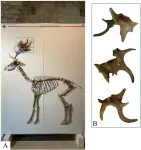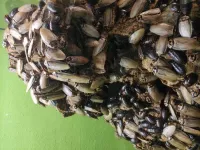(Press-News.org) BUFFALO, N.Y. — Millions of Americans use cannabis to treat a plethora of health conditions. They are rarely under a health care provider’s supervision and their access to quality information about the substances they are consuming and their potential risks is limited at best.
A paper published today in the American Journal of Public Health, the official journal of the American Public Health Association, by University at Buffalo researchers calls attention to this concerning and potentially dangerous situation, which they say is a result of a policy environment historically driven by politics, not science.
The paper explains why there needs to be a shift in cannabis policies to a public health approach as opposed to the prevailing, more punitive approach that pushes abstinence instead of public education. With cannabis now legal to some extent in most states, they say the case for such a shift is all the more urgent.
“Legalized cannabis is a freight train coming down the tracks and public health is going to get completely run over if it’s only set up, as the slogan goes, to ‘Just say no,’” says Daniel J. Kruger, PhD, senior author on the paper and research associate professor of emergency medicine in the Jacobs School of Medicine and Biomedical Sciences at UB. He is also a researcher with UB’s Clinical and Research Institute on Addictions.
“We are saying the field should move toward harm reduction and health promotion, using the tools with which public health practitioners are already familiar,” he says.
Kruger and his co-authors say that the social ecological model (SEM) of public health, which looks at specific behaviors at multiple levels, is well-suited as a comprehensive framework with which policies for cannabis should be developed. The model provides a way to study the range of cannabis products, their effects on human health, the behavior of the individual who consumes them, as well as the social environment they function in, and the organizations and policies that govern those behaviors.
Unlike tobacco or alcohol
Figuring out how to develop cannabis policies that safeguard public health is fundamentally different from developing policies for tobacco or alcohol, the researchers point out.
“Whereas alcohol, for example, is just one thing, there are hundreds of different psychoactive compounds in cannabis and they all do different things,” says Kruger. “It’s important to model the cannabinoids individually. We’re at the very beginning of knowing how they are different from each other.”
The lack of authoritative information about cannabis and wide disparities in how different states regulate it present an additional challenge.
“It would be great if there were federal policies other than criminalization for cannabis,” says Kruger. “Right now, you have 50 states plus territories, all of which have a mishmash of rules and policies that don’t coordinate. You can have products coming into one state from another that might not have the same regulations.”
And despite the establishment of state-regulated dispensaries such as in New York State, many cannabis users still obtain the product illegally.
Cannabis is classified by the federal government as a Schedule I controlled substance, which indicates it is likely to be abused and provides no medical benefit, even under medical supervision. The paper notes these characterizations directly contradict the empirical evidence.
The researchers say cannabis users often lack quality information about its effects and how best to reduce risk. They may access information from friends or family, and most who use it for medicinal purposes never disclose that information to their health care providers.
The role of public education
For that reason, Kruger notes, public education should play a significant role, a point that was made in the recent report on cannabis by the National Academies of Science, Engineering and Medicine.
People need to know basic things, Kruger explains, such as how much THC there is in a specific product and how much should someone take. He says consumers sometimes start with a low dose and then take more because cannabis can have a delayed effect when ingested. Additional doses can then cause unwanted effects, such as anxiety, paranoia and panic.
Using THC-O as a case study, the researchers show that with this one product, as with many other cannabis products, reliable information is hard to find. Although it has been recommended that vaporizing cannabis or eating edibles can be safer and produce less potent effects as harm-reduction techniques, in the case of THC-O, vaporizing it may produce ketene, the toxic gas that causes the same type of lung injury that vaping causes.
Recent indications that U.S. regulatory agencies may switch cannabis to a Schedule III substance from Schedule I is a positive step, the authors say, which may, in turn, make it more likely that cannabis policies can be standardized nationwide.
“We need to have scientifically informed policies,” concludes Kruger, “and for that we need research; we need clinical trials but not just clinical trials. We need to do other kinds of research to examine how people are using cannabis and what benefits or harms they are experiencing in order to fulfill the true mission of public health: to maximize the benefits and minimize the costs, risks and harms for the individual and society.”
Co-authors with Kruger include Jessica S. Kruger, PhD, clinical associate professor of community health and health behavior, UB’s School of Public Health and Health Professions, and Carlton CB Bone of Portland State University.
The work was not funded.
END
UB researchers show why cannabis policies should shift to a harm reduction, health promotion approach to safeguard public health
2024-10-23
ELSE PRESS RELEASES FROM THIS DATE:
Live well, think well: Research shows healthy habits tied to brain health
2024-10-23
EMBARGOED FOR RELEASE UNTIL 4 P.M. ET, WEDNESDAY, OCTOBER 23, 2024
MINNEAPOLIS – In middle-aged people, having risk factors like blood pressure, blood sugar and cholesterol that are not well-controlled combined with not following certain healthy habits including exercise, diet and sleep, are linked to a higher risk of stroke, dementia or depression later in life, according to a study published in the October 23, 2024, online issue of Neurology®, the medical journal of the American Academy of Neurology. These results do not prove that not having healthy habits increases the risk of these conditions, ...
Could poor sleep in middle age speed up brain aging?
2024-10-23
EMBARGOED FOR RELEASE UNTIL 4 P.M. ET, WEDNESDAY, OCTOBER 23, 2024
MINNEAPOLIS – People in early middle age who have poor sleep quality, including having difficulty falling or staying asleep, have more signs of poor brain health in late middle age, according to a study published in the October 23, 2024, online issue of Neurology®, the medical journal of the American Academy of Neurology. The study does not prove that poor sleep accelerates brain aging. It only shows an association between poor sleep quality and signs ...
Fossils unveil how southern Europe’s ecosystem changed through Glacial-Interglacial Stages
2024-10-23
Fossils from more than 600,000 years ago reveal how Southern Europe’s animal community shifted between warm and cold climate fluctuations, according to a study published October 23, 2024 in the open-access journal PLOS ONE by Beniamino Mecozzi from the Sapienza Università di Roma, Italy and colleagues.
The Notarchirico site has long been valued as a source of information on the Early-Middle Pleistocene, with fossils stretching from around 695 thousand to 614 thousand years ago. The authors of the present study examined mammalian fossils at the site and how they might ...
Your ability to balance on one leg may be a reliable indicator of neuromuscular aging, with men and women showing significant declines over the decades
2024-10-23
Your ability to balance on one leg may be a reliable indicator of neuromuscular aging, with men and women showing significant declines over the decades
###
Article URL: https://journals.plos.org/plosone/article?id=10.1371/journal.pone.0310764
Article Title: Age-related changes in gait, balance, and strength parameters: A cross-sectional study
Author Countries: U.S., Taiwan
Funding: AR-K25AG068368 RJP-Robert and Arlene Kogod Professorship in Geriatric Medicine KRK-W. Hall Wendel, Jr. Musculoskeletal Professorship The funders had no role in study design, data collection and analysis, decision to publish, or preparation of the manuscript. END ...
Most young adults in the UK consider non-consensual condom removal during sex to be wrong and a violation of consent, with almost 9 in 10 seeing it as a form of sexual assault, per survey of 18-25-yea
2024-10-23
Most young adults in the UK consider non-consensual condom removal during sex to be wrong and a violation of consent, with almost 9 in 10 seeing it as a form of sexual assault, per survey of 18-25-year-olds
###
Article URL: https://journals.plos.org/plosone/article?id=10.1371/journal.pone.0298561
Article Title: A UK survey of young people’s views on condom removal during sex
Author Countries: U.K.
Funding: The author(s) received no specific funding for this work. END ...
Under climate change scenarios, 30-44% more land in Ethiopia might become suitable for growing arabica coffee by 2080, although some cultivated areas might also become unsuitable, per modelling study
2024-10-23
Under climate change scenarios, 30-44% more land in Ethiopia might become suitable for growing arabica coffee by 2080, although some cultivated areas might also become unsuitable, per modelling study
###
Article URL: https://journals.plos.org/plosone/article?id=10.1371/journal.pone.0310945
Article Title: Analysis of current and future bioclimatic suitability for C. arabica production in Ethiopia
Author Countries: Ethiopia
Funding: The author(s) received no specific funding for this work. END ...
Cockroaches and maggots might be able to turn an invasive seaweed into a high quality compost, finds a new experimental study which provides hope for the environment and the circular economy
2024-10-23
Cockroaches and maggots might be able to turn an invasive seaweed into a high quality compost, finds a new experimental study which provides hope for the environment and the circular economy
###
Article URL: https://journals.plos.org/plosone/article?id=10.1371/journal.pone.0311483
Article Title: Invertebrate composting quality of the invasive alga Rugulopteryx okamurae, prospects for its bio-recycling, management and circular economy
Author Countries: Spain
Funding: All the financial support has been received by professor Jose Carlos García-Gómez and any funder have influence in the research. The details are: - JCGG (68/83 / 4081/0171) Organization of American ...
Implantable device may prevent death from opioid overdose
2024-10-23
The opioid epidemic claims more 70,000 lives each year in the U.S., and lifesaving interventions are urgently needed. Although naloxone, sold as an over-the-counter nasal spray or injectable, saves lives by quickly restoring normal breathing during an overdose, administrating the medication requires a knowledgeable bystander – limiting its lifesaving potential.
A team from Washington University School of Medicine in St. Louis and Northwestern University in Chicago has developed a device that may rescue people from overdose without bystander help. In animal studies, the researchers found that the implantable device detects an overdose, rapidly delivers naloxone ...
Half of young adults support prison time for non-consensual condom removal
2024-10-23
Almost nine in 10 young adults in the UK believe that removing a condom during sex without the other person’s permission is sexual assault, and around half support prison time as a penalty, finds a new study by UCL researchers.
This is the first UK study to cover views on non-consensual condom removal. It is published in PLOS ONE and surveyed 1,729 people between the ages of 18 and 25, living in the UK.
Young people were chosen as the focus of the study as, out of all demographics, they use condoms the most.
The survey consisted of several examples of non-consensual condom removal, which ...
‘Paleo-robots’ to help scientists understand how fish started to walk on land
2024-10-23
The transition from water to land is one of the most significant events in the history of life on Earth. Now, a team of roboticists, palaeontologists and biologists is using robots to study how the ancestors of modern land animals transitioned from swimming to walking, about 390 million years ago.
Writing in the journal Science Robotics, the research team, led by the University of Cambridge, outline how ‘palaeo-inspired robotics’ could provide a valuable experimental approach to studying how the pectoral and pelvic fins of ancient fish evolved ...







